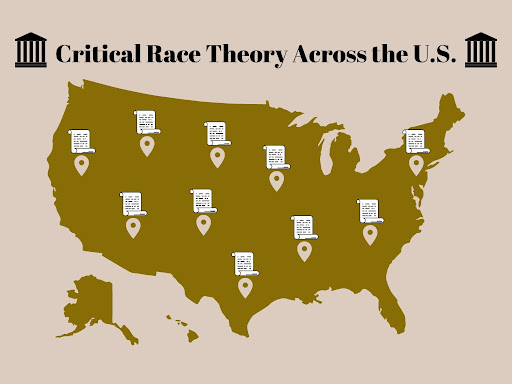A national threat
October 13, 2021

Across America, states are aiming to ban critical race theory from being taught in schools.
St. Louis isn’t the only place grappling with criticism over critical race theory. Currently, across the U.S., 28 states have introduced or will introduce bans on education about race-related topics.
In Texas, House Bill 3979 banned the education of critical race theory in schools starting Sept. 1, even though critical race theory isn’t taught in primary and secondary education. Though it’s important to note, even if it was, that doesn’t mean banning critical race theory is reasonable.
“Making laws outlawing critical race theory confirms the point that racism is embedded in the law,” sociologist Victor Ray said in Brookings. In other words, by banning critical race theory, lawmakers are simply demonstrating why it is necessary in the first place, in addition to ignoring that critical race theory isn’t even being taught in the vast majority of schools.
Five states in total have managed to pass legislation banning teachers from teaching about racial equity in general. In Louisiana, Rep. Ray Garofalo introduced such blatantly-racist legislation which would ban K-12 schools from teaching “certain topics related to race.”
“To cut out half, almost all, of America’s history will put Black kids at a disadvantage. If we don’t know our history, how can we come up with our own point of view? How can we grow?” student Re’Kal Hooker said to NBC News. Hooker attends the Living School in New Orleans, La.
The nation’s determination to root out critical race theory, or any education that tackles racism in general, only goes to show why it’s so important. Critical race theory is not something to be afraid of, and it’s not something to ban. Even our local school districts like Rockwood have been complicit in the fear, reassuring worried parents they certainly do not teach critical race theory. Though they say they “are committed to providing an equitable, welcoming and safe learning environment for all students,” this rhetoric only reinforces the idea there is something wrong with teaching critical race theory.
“The banning of CRT makes it seem like people of color’s identities aren’t worthy enough of being shared or talked about. It keeps the white narrative at the forefront of our education system,” Ekene Okolo, a student at Westview High School in California, said.
Experts have said it time and time again: critical race theory is not something to fear. When white people are frightened of confronting the fact that racism still persists, and we have something to do with it, then we will continue to live in an age of fear, where banning materials from being taught is not only acceptable, but frequent.
As Rashawn Ray writes for Brookings, “Scholars and activists who discuss CRT are not arguing that white people living now are to blame for what people did in the past. They are saying that white people living now have a moral responsibility to do something about how racism still impacts all of our lives today.”
The bottom line is, critical race theory is not an evil ideology or a ploy for divisiveness. Racism is the divisive force. This theory simply aims to address why these divisions occurred, who perpetuates them and how racism still harms people today. Whether it be studied in the legal field, or introduced to children beginning to grasp racism embedded in the U.S., critical race theory is not a weapon. Rather, it is an essential tool all of us can use to gain a better understanding of our world.
